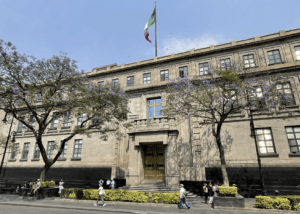Written by Diana Martinez, IDC Americas Programme Officer
Immigration detention in Mexico is one of the most serious problems that non-nationals encounter when entering the country without documents or when their status is irregular. For decades, such detention has been condemned on various levels by human rights organisations. Nevertheless, according to information published by the Unit for Migration Policy, Registration and Personal Identity, the detention of people with irregular status has increased considerably in Mexico over the past decade, from 88,506 in 2012 to 444,439 in 2022, with five times more people apprehended by the immigration authorities.
International, regional, and national human rights organisations have emitted various recommendations to the Mexican government for the modification of immigration policy that would only allow for the use of migrant detention in exceptional cases, in favour of a more generalised use of alternatives to detention. The most significant change thus far has been the prohibition of migrant detention for children and adolescents, as reflected in the 2020 immigration law.
In addition to advocacy by civil society organisations to limit immigration detention, various cases have been taken to the courts, on the basis of violations of due process, the use of arbitrary detention, solitary confinement, and the lack of access to asylum rights, among others. These cases have been accompanied by organisations, private lawyers, as well as the federal public defender.
Currently, two cases are awaiting resolution by the Supreme Court, supported by a close ally of IDC in Mexico, the Alaide Foppa Legal Clinic for Refugees from the Iberoamericana University. Given the negative impact of detention on migrant communities, as well as its importance for the public agenda, IDC contributed to Amicus Curiae in matters of detention and alternatives to detention that were presented to support the resolution of these cases.

These Amicus Curiae, technical documents for ministers of the court, contain specialised information or legal opinions regarding the issue of detention in other countries where the right to freedom is prioritised, as well as examples of the effectiveness of alternatives to detention.
The first Amicus Curiae was presented by the Grupo de Acción por la No Detención de Personas Refugiadas, a network of organisations, jointly headed up by IDC and Asylum Access Mexico, that promotes the elimination of detention for people in need of international protection. Based on findings from recent studies undertaken by IDC, the technical reports provided the court with successful experiences of the use of alternatives to detention, including in countries which, like Mexico, are considered to be transit countries.
The second Amicus was written by IDC, together with the Consejo Global de Litigio Estratégico para los Derechos de los Refugiados, comprising a group of law specialists, defenders, and academics with experience in International law regarding the rights of refugees, forced migration, and the right to nationality. This document presented a legal opinion, based on international standards, on the exceptionality of detention and global trends towards rights-based alternatives.
Through these interventions, IDC, together with our members and allies seek to contribute to changes that will significantly impact the lives of migrant people. In the upcoming weeks, the Supreme Court, the highest constitutional court in the country, will once again have the opportunity to find in favor of due process and the freedom of the migrant population.
Prior to the publication of this blog, the First District Court of the Supreme Court resolved one of the cases favourably by establishing that, independently of the duration of an immigration administrative procedure, the holding of foreign nationals in detention centres should not exceed 36 hours from the time they are first detained, as established in the Mexican Constitution for administrative offences. The First District Court determined that once this period has elapsed, those subject to immigration procedures should continue these while free.